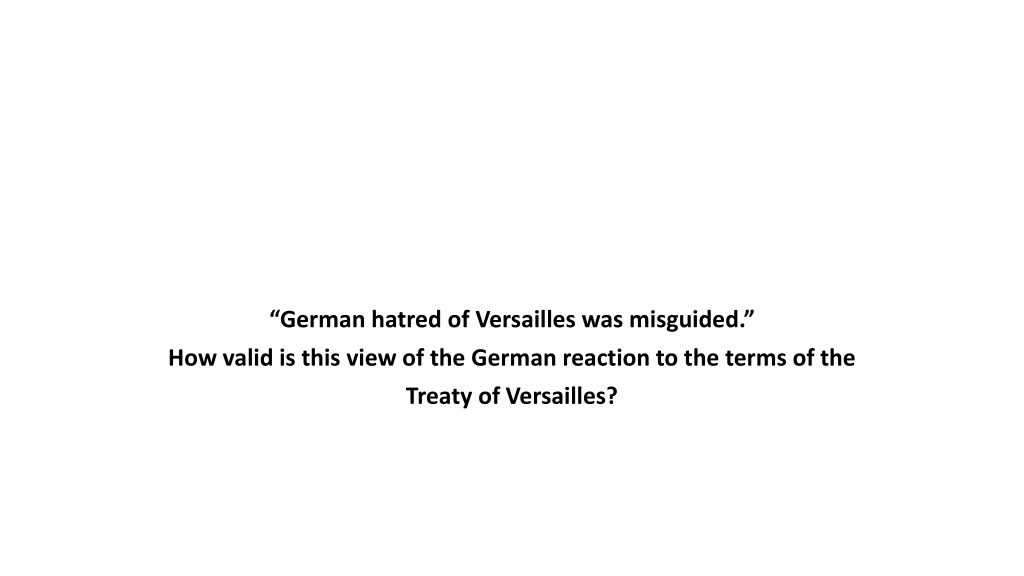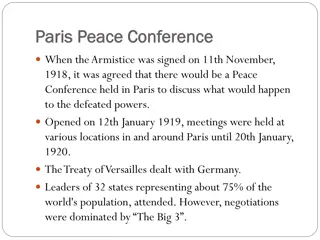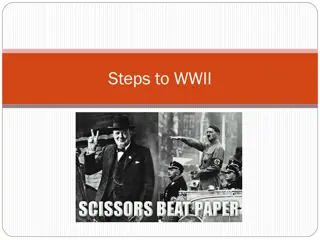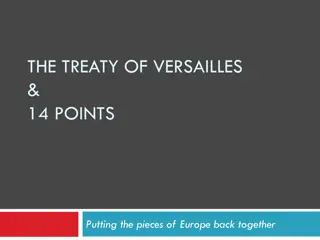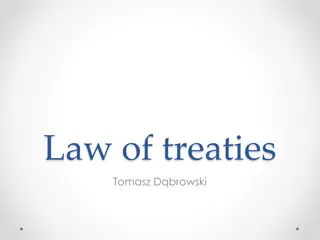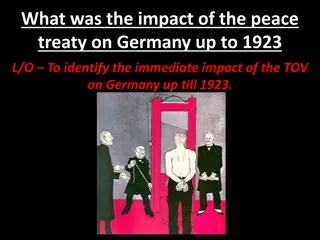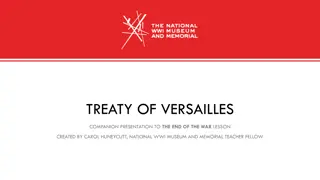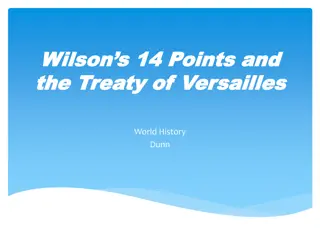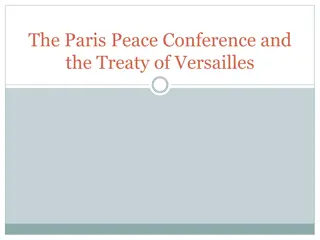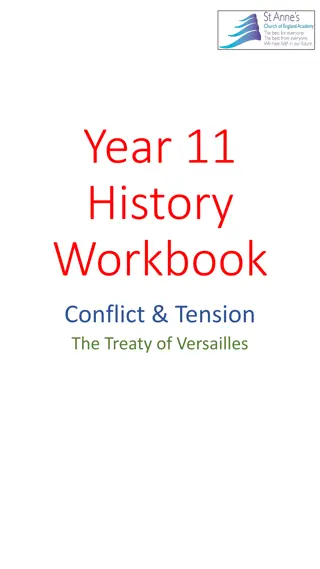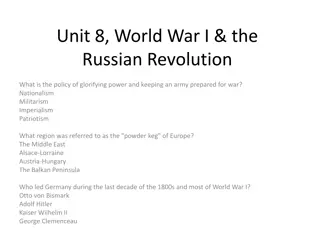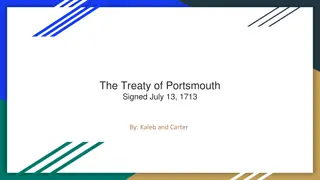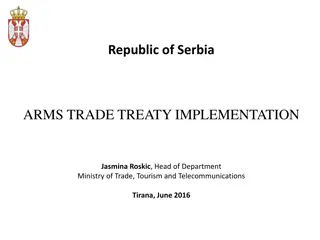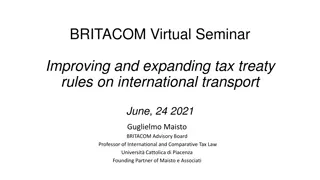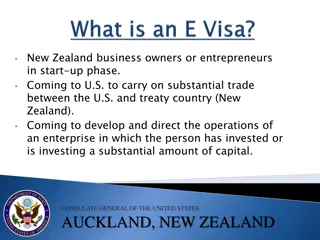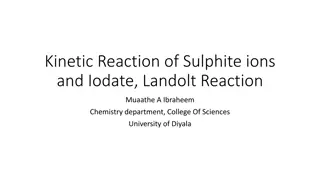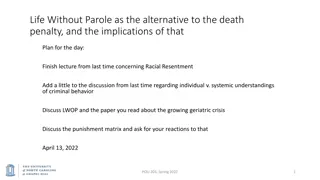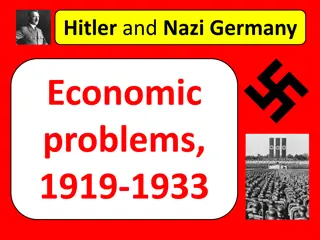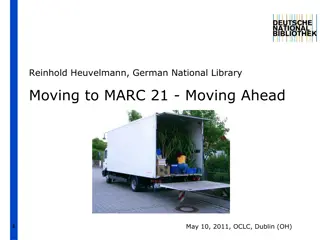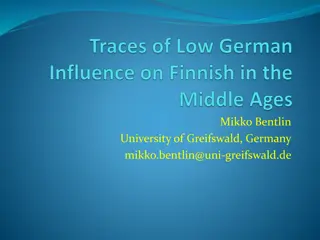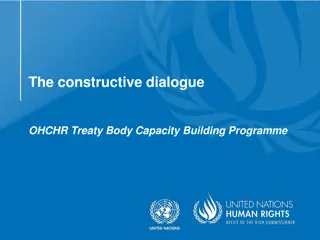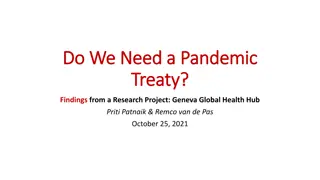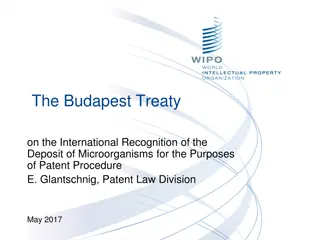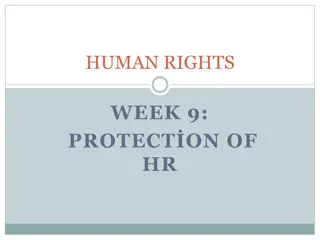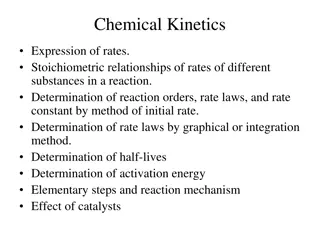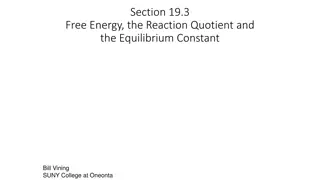German Reaction to Treaty of Versailles: Misguided Hatred or Justified Resentment?
German resentment towards the Treaty of Versailles, seen by some as misguided, stemmed from divergent expectations, harsh territorial losses, and a perception of unfair treatment. While the treaty was not as severe as initially anticipated, it triggered a widespread sense of disillusionment and national honor injury among the German populace, exacerbated by unrealistic government assurances and lack of involvement in negotiations.
Uploaded on Oct 02, 2024 | 0 Views
Download Presentation

Please find below an Image/Link to download the presentation.
The content on the website is provided AS IS for your information and personal use only. It may not be sold, licensed, or shared on other websites without obtaining consent from the author. Download presentation by click this link. If you encounter any issues during the download, it is possible that the publisher has removed the file from their server.
E N D
Presentation Transcript
German hatred of Versailles was misguided. How valid is this view of the German reaction to the terms of the Treaty of Versailles?
Context German war plans were based on winning and imposing a severe treaty on the allies. They had borrowed a huge amount from their own people in war bonds and needed to force other countries to pay reparations if they were to recover. The German generals targeted outright victory in the spring of 1918 when a more lenient treaty could have been achieved. The Treaty of Brest-Litovsk in March 1918 saw the Germans punish the Russians harshly.
German Expectations German people had expectations that the Treaty would be lenient and based on the 14 Points of Woodrow Wilson. The actual terms of the treaty came as a real shock to the people. The new government were however more aware than the German people of the chances of a harsh treaty as the Lansing note of the 5th of November 1918 informed them that the USA supported reparations and the loss of territory. The German delegation under Count Brockdorff-Rantzau, whilst not involved in the negotiations, had prior knowledge of the treaty through corridor conversations .
Carthaginian peace Lee argues Germans see it as a Carthaginian peace [severe and vindictive treatment of a conquered enemy] but that much of Versailles can be justified. The big mistake, he argues was not involving Germany in the negotiations.
German Expectations Germans felt that they had been treated unfairly but the German government have responsibility for much of the unrealistic expectations of the German people. The treaty seemed harsh to most Germans and was detested across the political spectrum. Thus a thoroughly unrealistic mood of illusion and aggrieved sense of national honour pervaded both the political establishment and public opinion at large as the process of peacemaking began. E.J. Feuchtwanger Despite this anger the Treaty was not as harsh as the French had envisaged. It was much more of a compromise between French aims and the ideas of Woodrow Wilson.
Are territorial losses harsh? Alsace and Lorraine given back to France [Germany had taken them in 1871]. These areas contained both French and German speaking peoples. From 1919 the French deported over 100,000 German speakers who had settled in Alsace Lorraine post 1871. Anschluss with Austria forbidden. This was done to prevent Germany dominating the middle of Europe [mitteleuropa]. Many Germans had a nationalistic desire for a greater Germany that would include Austria. Polish corridor created by giving West Prussia, Posen and upper Silesia to Poland.
Are territorial losses harsh? Polish Corridor created to give Poland access to the sea logical. But it split Germany in two and gave some Germans away to Poland. Terms on land seemed to not recognise German right to self- determination but did for other countries. Terms on land not really altered during life of Weimar republic.
Are military terms harsh? Germany had always prided themselves on having the best army in the world. This was destroyed by the Treaty. Germans had expected all countries to be forced to disarm not just Germany. Army reduced to 100,000 with no conscription and only 4,000 officers. No tanks, submarines, airforce or poisoned gas. Only 6 battleships. Rhineland made into a DMZ.
Are military terms harsh? Germany made Treaty of Berlin with Russia in 1926 that had secret clauses that allowed the German army to train with poison gas and tanks in the Soviet Union. They found a way around some of the harsh terms. They reduced the impact of the Treaty.
Were the financial terms harsh? Germany had to pay reparations to make good the damage done in WW1. Reparations would be paid to France, Belgium and Britain. The Germans had to sign without knowing the amount the blank cheque . A reparations Commission decided the amount of 6.6 billion in 1920. Germany had punished the Russians by imposing severe reparations in Brest-Litovsk.
Were financial terms harsh? The Germans were infuriated at the reparations issue. It became a source of great debate in Germany. Right wing nationalist politicians argued that the concept of reparations and the amount finally settled on were intolerable. They argued for the repudiation of the treaty which was popular and easy to do when not in power. The centre and moderate left argued for a policy of fulfilment to show Germany was trying to pay but mainly to demonstrate how impossible the demands were.
Were financial terms harsh? All Germany s ills flowing from defeat and Versailles were encapsulated in the reparations question. E.J. Feuchtwanger Some historians suggest that reparations were harsh in theory but more moderate in practice. They point to statistics which show the reduction in amount and easier terms introduced by the Dawes and Young plans. They also point out that Germany received more in loans than it paid in reparations 1924-1929.See page 82 of Hite and Hinton. Other historians point out that reparations had their biggest impact in the early years of Weimar and led to real problems at a difficult time.
Were financial terms harsh? Conan Fischer argues that the initial and continuing impact of reparations was massive. His argument centres on the imposition of bank service charges which the Germans had to pay in addition to the reparations burden. These charges amounted to 35,000 million (DM) for every 50,000 million (DM) of reparations. Conan Fischer argues that these costs saw Germany unable to feed and care for their population.
Were financial terms harsh? He argues there was slow starvation in Germany in the years after WW1 and that this had a massive impact on the likelihood of the Weimar Republic surviving. In short he argues that reparations caused short term problems of famine proportions which seriously undermined the Weimar Republic at practical and psychological levels. This damage siphoned support from the new republic in both the immediate and longer term.
Were other terms harsh? War Guilt Clause[231]. Germany had to accept all the blame for starting the war. This caused great anger in Germany as many viewed other countries as partly to blame. Diktat Germany was allowed no say in the negotiations that were held before the Treaty. The Locarno Treaties of 1925 partially addressed this criticism of Versailles as Germany was involved in discussions on Eastern and Western borders. Germany was not allowed to join the new organisation called the League of Nations.
Overview Many historians point to differences between the design of the treaty and its implementation, suggesting the treaty was more lenient in practice than in theory. R J Evans takes the view that Treaty of Versailles was greeted with incredulous horror by the majority of Germans. The sense of outrage and disbelief that swept through the upper and middle classes like a shockwave was almost universal and had a massive impact on many working class supporters of the moderate Social Democrats as well. Collier and Pedley take the view that Versailles left Germany humiliated and scarred but it was also left potentially strong. The treaty left Germany as a united nation state with the potential to regain its status as an important world power. Germany was not weakened as much as Germans imagined.
Overview Colin Storer takes the view that Germans of all political persuasions saw Versailles as unreasonable and unacceptable. The terms of the treaty were considered by the population as a whole as not only unfair but also insulting: an affront to national honour. Stephen Lee takes the view that Versailles was justified by the need to safeguard against the very real threat posed by Germany, to rebuild France and to give viability to the new democracies of Europe. But because the Allies excluded Germany from the peace negotiating process Germany came to see itself as a victim without actually being destroyed. RM Watt in The Kings Depart, while commenting that some treaty terms [like Article 231] were thoughtless in their phrasing, criticises the Weimar government for their constant attempts to play the victim and wriggle out of any punishment; looking to gain support for themselves by playing to the gallery of a German public opinion they had created.
